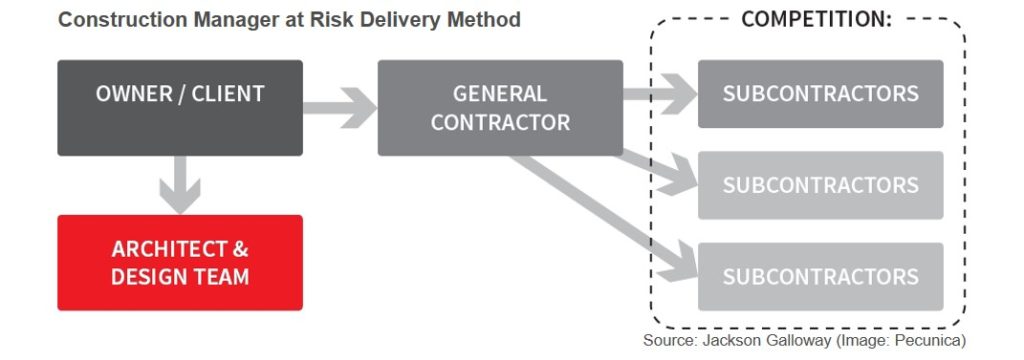What Is Construction Project Management?
Construction Project Management
Construction project management is the coordination and supervision of a project's construction process, from early planning to erecting and finishing the product for project close-out. It is a function of overall development management.
Project management is a specialist role in the project development process with responsibility for the project management plan and project delivery according to the cost budget and construction project schedule. It calls for the management of commercial risk by managing the contractual arrangements and checking deliverables to ensure compliance with agreements.
A construction project manager (CPM) is tasked with planning, coordination, budgeting, supervision and running the construction project. The project manager oversees the day-to-day work of the project team, ensures that the construction works meet building codes and specs, controls costs, and proceed according to the project management plan.

The project management plan is the documentation for project delivery that lays out the strategy for managing a project, it outlining roles and responsibilities and defines the policies, procedures and priorities to be implemented. They are generally prepared either by the project development manager or project manager.
Where the developer appoints or employs the project manager, the project manager is directly responsible to the developer. Where the developer engages a development manager for overall project management, the development manager assumes the project management function or appoints the project manager.
When engaged directly by developers, project managers are commonly also charged with setting the parameters, finances, and calendar; screening and hiring subcontractors and on-site workers; the strategy for potential conflict resolution; and resolving disputes, mitigating risks, and understanding legal issues.
Project managers rarely participate directly in construction. Instead, they aim to maintain the progress and interaction of the project teams in order to control cost, maximize benefits to the developer, and reduce the risk of failure.
Construction Procurement and Management
Procurement routes are the methods of procuring and delivering the design and construction of built structures. Design-bid-build, design-build, and construction manager at risk (CMAR) are the most commonly used project delivery methods.
Under design-bid-build (DBB) procurement, the project owner contracts an architect to produce a conceptual design, bid documents and specs. General contractors are then invited to bid on the project, with the winner awarded a separate construction contract. The GC is responsible for recruiting, managing, and compensating all subcontractors through open bidding. Since the design is finalized without collaboration with the GC, this approach tends to lead to costly reworks and delays.
In a design-build (DB) arrangement, a construction firm, typically led by an experienced GC or architect, is solely responsible for both the design and execution of a construction project simultaneously. The design-builder maintains a full team of design and contracting professionals and collaborates with the client/owner to design and spec the building and staffing it with subcontractors. Under a single design-build contract between the client and GC, the design-builder can veto or change designs it considers too complex or expensive to implement.
Under the construction manager at risk (CMAR) approach, a developer engages and consults a construction manager to provide cost feedback during the design process, who then usually acts as the general contractor. A guaranteed maximum price (GMP) is negotiated based on the as-yet-completed design to include the construction manager's estimate of the remaining design features and the construction work. CMAR allows for good cost estimating at the planning stage and faster transition from design to implementation, but typically at the cost of transparency.

The construction delivery method chosen depends on the developer's project strategy and the amount of desired involvement in, control over, and accountability for the construction process. Regardless of the method, the developer remains the owner of and responsible for the project.
Sustainable Construction
Sustainable construction is the process of applying processes and practices to develop and build structures that are environmentally responsible and resource-efficient throughout the property's life cycle. It is undertaken to meet the goals of the developer, sponsors, investors, the community and other stakeholders for sustainable design and high-performance green buildings.
Sustainable construction spans the value chain of development projects - siting, design, construction, operation, maintenance, renovation and deconstruction. It considers a building's complete life cycle and focuses on the reduction of resource consumption, reusing resources, protecting nature, eliminating toxins, life-cycle costing, and product quality.
Sustainable procurement (SP) is about the reduction of consumption of goods within a building or premises and/or the sourcing of sustainable materials and equipment with the aim to minimize the negative impact of procurement to the community, society and the environment. Procurement is sustainable when developers make procurement decisions for projects that integrate requirements, specifications and criteria that protect the environment, are in favor of social progress, and support economic development.
Sustainable construction utilizes industrial waste, by-products or recycled materials to decrease carbon dioxide emissions and preserve natural resources. It seeks resource efficiency, improves the quality of products and services, and ultimately optimizes costs.
Whole-cycle costing encourages and recognizes sustainable development reporting, commissioning and certification initiatives that ensure all building services operate to their full potential. If materials are truly sustainable, their embodied energy - the amount of energy to produce it - and the operational energy is relatively low.

Sustainable construction depends in large measure on project procurement. Sustainable procurement practices may be imposed by legislation, the terms of the construction contract, or the policies of the developer. It is the responsibility of the developer to ensure that sustainable construction and sustainable procurement principles are adopted and implemented in their development projects.
Copyright © 2020 Pecunica LLC. All rights reserved.